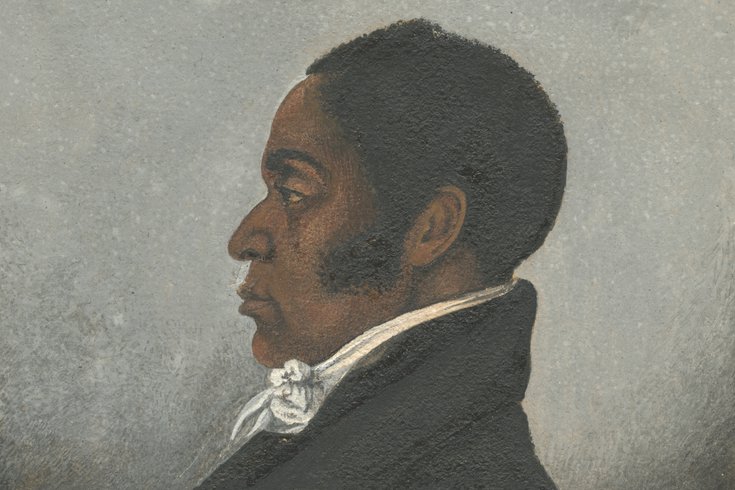
February 08, 2023
 Provided image/Collection of the Historical Society of Pennsylvania
Provided image/Collection of the Historical Society of Pennsylvania
James Forten, as captured in this 1818 portrait, was a lifelong Philadelphian who fought in the Revolutionary War and rallied for abolition.
He was born in colonial Philadelphia in 1766 and fought for freedom all his life — yet James Forten is not remembered as one of America's founding fathers.
The Museum of the American Revolution seeks to correct the historical record with its new exhibit on Forten and his family, set to open on Saturday, Feb. 11 as part of its Black History Month programming. "Black Founders: The Forten Family of Philadelphia" will feature paintings, music listening stations and an 18th century cannon but more than anything, it will educate visitors on the remarkable lives of James Forten, his wife Charlotte Vandine Forten and their equally courageous children.
Forten was born free in Philadelphia, the grandson of a slave who had "obtained his own freedom," as Forten told friends. His first home was in modern-day Society Hill, on Lombard Street between 3rd and 4th streets. As a boy, he heard the Declaration of Independence read aloud on July 8, 1776 and by the age of 14, he had joined the crew of the Royal Louis as a powder boy, carrying fuel for the ship's cannons across the deck.
The British navy captured the Royal Louis, making Forten a prisoner of war aboard a "floating jail" crawling with disease. It was actually his best option; most of the other Black crewman were sold into slavery in the West Indies, regardless of whether they were actually enslaved in America. Forten had avoided this fate thanks to a friendship with the captain's son, who offered to take him to England if Forten renounced his country. He refused, choosing the prison ship instead.
After seven months, Forten was released in a prisoner exchange, unceremoniously dumped in New York and left with no choice but to walk all the way back to Philadelphia. When he finally reached home and recovered, he established a successful sailmaking business in town. He married Charlotte Vandine in 1806, just two years after his first wife, Martha Beatte, died suddenly at the age of 20. The couple had nine children, including Harriet, Margaretta and Sarah Louisa, the famous "Forten Sisters."
Those sisters, along with their mother Charlotte, would go on to found the Philadelphia Female Anti-Slavery Society, an abolitionist organization that lobbied politicians, supported the free Black community and even aided fugitive slaves through its work with the Philadelphia Vigilante Committee. That committee was headed by Robert Purvis, husband of Harriet. The couple lived in a large house just outside the city, which they used to harbor fugitive slaves such as William and Ellen Craft. Harmony Hall, as their home was known, was a stop on the Underground Railroad, helping an estimated 9,000 slaves to freedom.
Activism was a Forten family affair, and James was no exception. He spent his life railing against the colonization movement to send free Blacks to Africa, chairing meetings of Philadelphia's free Black community to discuss and oppose the idea. "We are determined to have neither lot nor portion in a plan which we believe to be intended to perpetuate slavery in U. States," an 1819 notice signed by Forten in The Carlisle Republican read. "We never will separate ourselves voluntarily from the slave population in this country; they are our brethren," an earlier 1817 item in The Weekly Recorder read.
Forten later became aligned with William Lloyd Garrison, loaning him money to start his abolitionist newspaper The Liberator, to which Forten frequently contributed. He would also serve as vice president of the American Anti-Slavery Society before his death in 1842 at the age of 75. His funeral was "the largest that has been seen in Philadelphia for a great length of time," according to The Liberator, which devoted weeks of coverage to Forten's life and legacy.
"James Forten was a prodigy," the paper wrote. "One of the noblest men that ever trod upon the earth."
To learn more about Forten and his family's remarkable accomplishments, visit the "Black Founders" exhibit between Saturday, Feb. 11 and Sunday, Nov. 26 during the museum's daily hours of 10 a.m. through 5 p.m.
Follow Kristin & PhillyVoice on Twitter: @kristin_hunt
| @thePhillyVoice
Like us on Facebook: PhillyVoice
Have a news tip? Let us know.